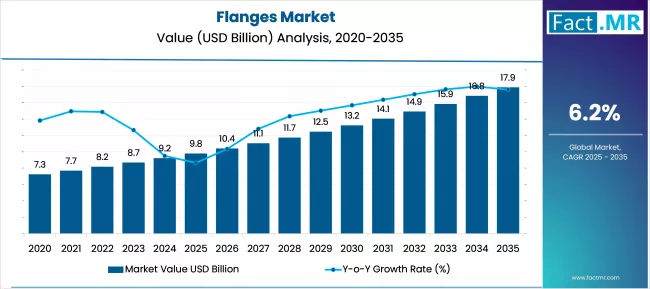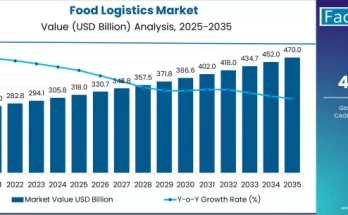The flanges market is witnessing significant growth as industrial sectors increasingly focus on efficient and safe piping systems for fluid transport, chemical processing, and energy infrastructure. Flanges, which are used to connect pipes, valves, and other equipment, are critical components in industries such as oil and gas, petrochemicals, power generation, water treatment, and manufacturing.
As industries prioritize reliability, maintenance efficiency, and leak prevention, flanges are becoming essential components for both new installations and maintenance operations. The market growth is driven by the need for standardized, high-quality, and durable connections capable of withstanding high pressures, temperatures, and corrosive environments.
Market Overview
Flanges are mechanical components used to join piping sections, enabling assembly, disassembly, and maintenance without compromising system integrity. They provide robust sealing solutions while ensuring structural stability, leak prevention, and ease of operation.
The flanges market is influenced by advancements in material science, including stainless steel, alloy steel, and corrosion-resistant composites, which improve durability and resistance to harsh operating conditions. Additionally, manufacturers are developing precision-engineered flanges to meet the requirements of high-pressure and high-temperature applications.
The integration of digital design, computer-aided manufacturing, and quality control systems has enhanced the reliability and performance of modern flanges. Manufacturers are also increasingly focusing on environmental compliance and sustainability, producing flanges with reduced material waste and energy-efficient manufacturing processes.
Flanges play a crucial role in industries aiming to optimize operational efficiency, reduce downtime, and ensure compliance with stringent safety and environmental regulations. The ability to provide leak-proof, high-performance connections makes flanges indispensable in industrial piping systems.
Regional Insights
North America
North America remains a key market for flanges due to its advanced industrial infrastructure and strong presence of oil, gas, and chemical industries. High standards for safety and operational reliability drive demand for high-quality flanges and customized solutions.
Europe
Europe emphasizes sustainable and energy-efficient industrial operations, boosting demand for flanges made from corrosion-resistant and lightweight materials. Regulatory frameworks enforcing safety and environmental compliance encourage the adoption of advanced flange designs.
Asia-Pacific
Asia-Pacific is a high-growth region due to rapid industrialization, urbanization, and energy sector expansion. Countries like China, India, and Japan are investing in infrastructure development, power plants, and petrochemical facilities, driving demand for robust and versatile flanges.
Rest of the World
Latin America, the Middle East, and Africa are gradually expanding their industrial capabilities. Investments in oil and gas exploration, water treatment projects, and infrastructure modernization are fueling the adoption of reliable piping systems equipped with high-performance flanges.
Key Trends & Forecast
- Shift Toward High-Performance Materials
Manufacturers are increasingly using stainless steel, alloy steel, and advanced composites to produce flanges that offer superior strength, corrosion resistance, and longevity, meeting the requirements of demanding industrial environments. - Focus on Standardization and Compatibility
Adoption of industry standards for dimensions, pressure ratings, and sealing performance ensures interoperability, reduces operational errors, and simplifies maintenance processes. - Integration with Smart Industrial Systems
Digital design and computer-aided manufacturing are enabling the production of precise, consistent, and high-quality flanges. Sensors and monitoring systems are being integrated in some applications for predictive maintenance. - Sustainability and Eco-Friendly Manufacturing
Manufacturers are developing flanges with minimal material wastage, energy-efficient production, and lower carbon footprints. This trend aligns with growing global emphasis on environmentally responsible industrial practices. - Customization and Application-Specific Solutions
End users are increasingly demanding flanges tailored to specific operational conditions, including high-temperature, high-pressure, and corrosive environments. Customized solutions improve efficiency and system reliability.
Applications & End-Use Outlook
Flanges are essential across a wide range of industrial applications, supporting the functionality, safety, and efficiency of piping systems:
- Oil & Gas: Flanges are extensively used in pipelines, refineries, and offshore facilities, ensuring leak-proof connections under high pressure and temperature conditions.
- Power Generation: In thermal, nuclear, and renewable energy plants, flanges connect critical piping systems, turbines, and heat exchangers.
- Chemical & Petrochemical Industry: Flanges provide safe connections for corrosive fluids and chemical transport pipelines, reducing risk of leaks and operational downtime.
- Water & Wastewater Management: Flanges are used in treatment plants and distribution systems to maintain secure, durable pipe connections.
- Construction & Industrial Manufacturing: They are used for fluid transport systems in factories, infrastructure projects, and heavy machinery installations.
Integration with modern piping systems ensures easy assembly, routine maintenance, and operational flexibility, allowing industrial facilities to optimize productivity while maintaining safety and reliability.
Challenges and Opportunities
The flanges market faces challenges such as raw material cost fluctuations, stringent regulatory requirements, and high manufacturing precision demands. Additionally, complex installation environments and variable industrial standards across regions can create operational challenges.
However, opportunities abound for innovation and growth. Manufacturers investing in high-strength, corrosion-resistant materials, advanced fabrication techniques, and modular designs can capture market share. The demand for customized, application-specific, and eco-friendly flanges presents potential for differentiation and technological leadership.
Emerging markets with growing energy, water, and industrial infrastructure projects offer significant expansion opportunities. Collaborations between flange manufacturers and industrial equipment providers are accelerating product innovation and adoption in diverse end-use industries.
Conclusion
The flanges market is a cornerstone of modern industrial piping systems, ensuring safety, efficiency, and reliability across a wide range of applications. As industries increasingly prioritize operational efficiency, environmental compliance, and equipment longevity, high-quality and technologically advanced flanges are becoming essential.
Technological advancements, material innovation, and digital manufacturing processes are transforming the flanges market, enabling more precise, durable, and eco-friendly solutions. By investing in modern flange solutions, industrial operators can improve productivity, reduce downtime, and maintain compliance with stringent safety and environmental standards.
Flanges are not just connectors — they are critical enablers of reliable, safe, and sustainable industrial operations, powering growth in infrastructure, energy, manufacturing, and beyond.
Browse Full Report – https://www.factmr.com/report/4472/flanges-market



